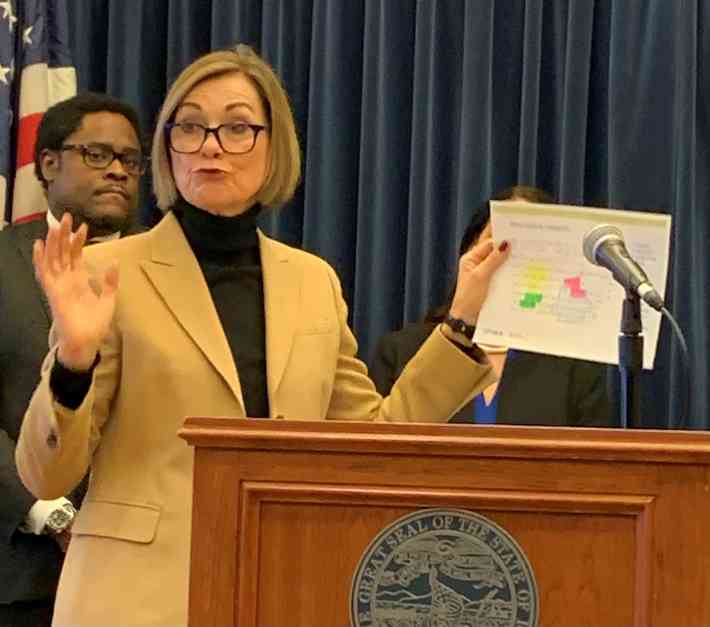Iowa Governor Proposes $150M Investment in Medical Residencies
July 1 marks a significant target date for an ambitious project in Iowa. State officials are gearing up to kick off a program aimed at training 460 physicians across 14 hospitals in the state over the next four years. At the forefront of this initiative is Governor Kim Reynolds, who is seeking a substantial $150 million in federal funding to support this endeavor.
During a recent news conference, Governor Reynolds highlighted the pivotal role that medical residencies play in shaping where doctors ultimately choose to practice. She emphasized that this program could be a game-changer for Iowa, attracting talented physicians to the state and addressing critical healthcare needs.
Despite the current focus on budget cuts by the Trump Administration, Governor Reynolds expressed confidence in securing federal funding for the project. She assured reporters that a compelling case would be presented to secure approval, noting that several other states have successfully implemented similar programs. Reynolds also underscored the importance of leveraging state funds to draw down federal support, showcasing Iowa’s commitment to the initiative.
Supporting Rural Healthcare Needs
Shelly Russell, CEO of the Mitchell County Regional Health Center, and chair-elect of the Iowa Hospital Association Board of Trustees, highlighted the significance of medical residencies for rural hospitals. She emphasized the critical need for additional medical staff, particularly in rural areas where hospitals operate around the clock to address healthcare needs.
Russell pointed out that rural hospitals face unique challenges, as they cannot afford to close early or understaffed due to emergencies that arise at any time of day. The implementation of medical residencies in Iowa hospitals is poised to alleviate these staffing pressures and enhance the quality of care provided to patients across the state.
Addressing Healthcare Disparities
In addition to the focus on medical residencies, Governor Reynolds has put forth a comprehensive healthcare package that addresses various health-related issues in the state. One key aspect of the proposal is to raise the Medicaid reimbursement rate for patients with complex pregnancies, aiming to better support doctors and hospitals that provide specialized care.
Currently, Iowa reimburses doctors, hospitals, and physicians at a fixed Medicaid rate, regardless of the level of care required for complex pregnancies. Governor Reynolds highlighted the need to align reimbursement rates with the actual services provided, ensuring fair compensation for healthcare providers and improving outcomes for mothers and babies.
Furthermore, the healthcare package includes plans to expand a state program that supports hospitals offering specialized care. Kevin DeRonde, CEO of Mahaska Health Partnership in Oskaloosa, shared insights on the impact of the program at his hospital, which has become a regional hub for deliveries and specialized services.
DeRonde noted the significant increase in births at Mahaska Health, with a notable rise in the number of deliveries and the provision of specialized fertility services. The expansion of this program is poised to enhance access to quality healthcare services and meet the growing healthcare needs of the community.
Governor Reynolds’ healthcare package also includes initiatives to consolidate and enhance student loan repayment programs for doctors who commit to practicing in Iowa. By incentivizing healthcare professionals to remain in the state, these programs aim to strengthen the healthcare workforce and improve access to care for all Iowans.
In conclusion, Governor Reynolds’ bold proposal to invest $150 million in medical residencies and comprehensive healthcare initiatives underscores the state’s commitment to addressing healthcare disparities, enhancing rural healthcare services, and attracting top talent to Iowa’s healthcare sector. The impact of these programs is poised to transform healthcare delivery in the state and improve health outcomes for residents across Iowa.









